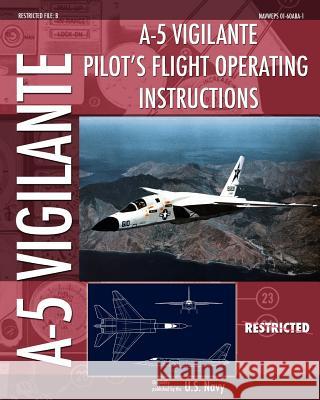A-5 Vigilante Pilot's Flight Operating Instructions » książka
A-5 Vigilante Pilot's Flight Operating Instructions
ISBN-13: 9781937684723 / Angielski / Miękka / 2012 / 330 str.
North American's A-5 Vigilante served for nearly two decades as an all-weather supersonic strike aircraft and reconnaissance platform. An outgrowth of studies begun in 1953, the prototype first flew in 1958. Originally designed to operate as a nuclear delivery system, the Vigilante was at the time of its introduction the largest and most complex aircraft to operate from a carrier. Carrying a crew of two, the Vigilante was equipped with two General Electric J-79 turbojets, and utilized a single tailfin. It featured a high-mounted swept wing with aluminum-lithium alloy skins and no ailerons. The Vigilante featured cutting-edge technology and was one of the first aircraft to use fly-by-wire systems and a heads-up display, as well as inertial navigation among other advanced systems. The Vigilante's bomb bay was located between the aircraft's engines, giving it a streamlined appearance and making the large aircraft surprisingly agile. As a result of shifts within the Navy's nuclear strategy brought on by the advent of the nuclear ballistic missile submarine, the A-5 never served in a strategic role. Instead most were converted to the RA-5C reconnaissance platform. Beginning in 1964, Vigilantes flew missions in Vietnam. Although extremely fast and maneuverable, the RA-5C's combat record was far from stellar. Difficult and expensive to maintain in the field, the Vigilante also compiled a dubious loss record. Out of 156 built, 18 aircraft were lost in combat and nine more succumbed to accidents during the Vietnam conflict. After 1974, a phase out of the Vigilante began with smaller, less complex fighter aircraft taking on the recon role. The RA-5C was deployed for the last time in 1979. Originally printed by the U.S. Air Force, this A-5A Vigilante flight operating manual taught pilots everything they needed to know before entering the cockpit. Originally classified "Restricted," this manual was declassified long ago and is here reprinted in book form.
North Americans A-5 Vigilante served for nearly two decades as an all-weather supersonic strike aircraft and reconnaissance platform. An outgrowth of studies begun in 1953, the prototype first flew in 1958. Originally designed to operate as a nuclear delivery system, the Vigilante was at the time of its introduction the largest and most complex aircraft to operate from a carrier. Carrying a crew of two, the Vigilante was equipped with two General Electric J-79 turbojets, and utilized a single tailfin. It featured a high-mounted swept wing with aluminum-lithium alloy skins and no ailerons. The Vigilante featured cutting-edge technology and was one of the first aircraft to use fly-by-wire systems and a heads-up display, as well as inertial navigation among other advanced systems. The Vigilantes bomb bay was located between the aircrafts engines, giving it a streamlined appearance and making the large aircraft surprisingly agile. As a result of shifts within the Navys nuclear strategy brought on by the advent of the nuclear ballistic missile submarine, the A-5 never served in a strategic role. Instead most were converted to the RA-5C reconnaissance platform. Beginning in 1964, Vigilantes flew missions in Vietnam. Although extremely fast and maneuverable, the RA-5Cs combat record was far from stellar. Difficult and expensive to maintain in the field, the Vigilante also compiled a dubious loss record. Out of 156 built, 18 aircraft were lost in combat and nine more succumbed to accidents during the Vietnam conflict. After 1974, a phase out of the Vigilante began with smaller, less complex fighter aircraft taking on the recon role. The RA-5C was deployed for the last time in 1979.Originally printed by the U.S. Air Force, this A-5A Vigilante flight operating manual taught pilots everything they needed to know before entering the cockpit. Originally classified "Restricted", this manual was declassified long ago and is here reprinted in book form.











